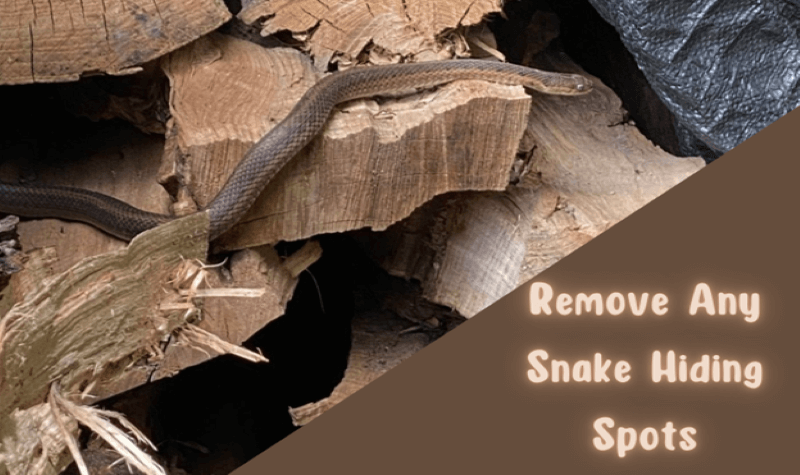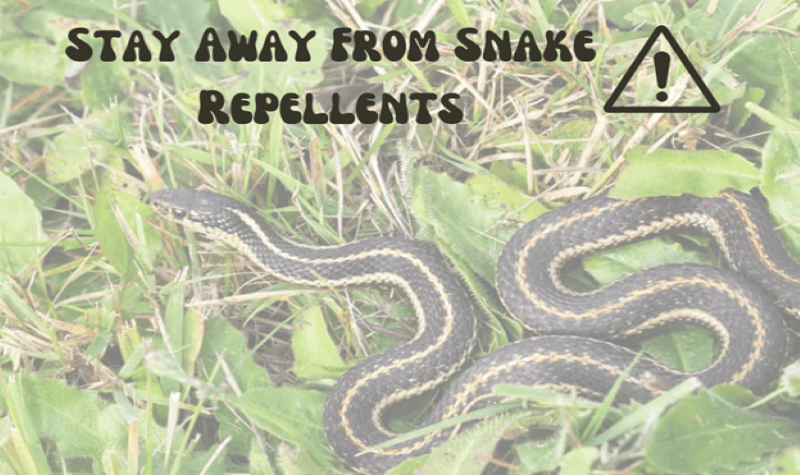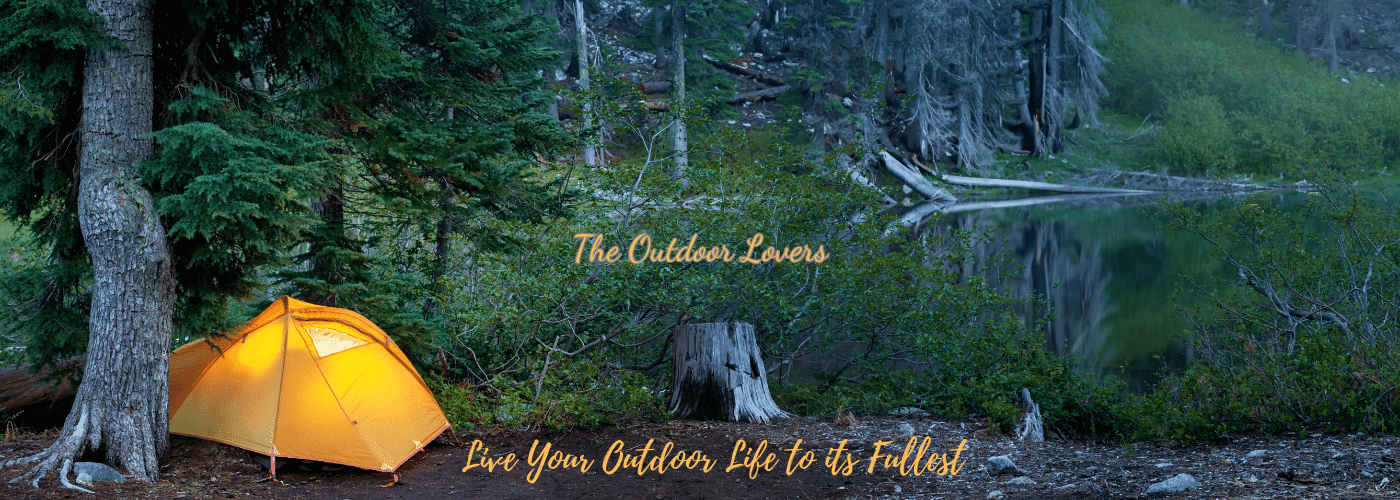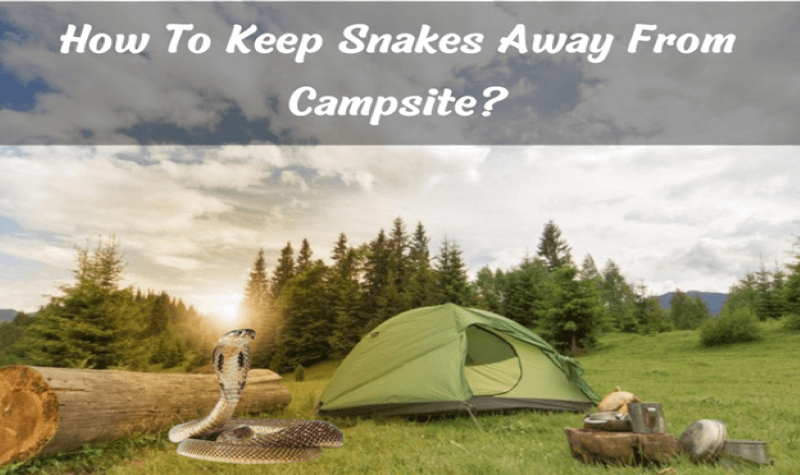It’s obvious why someone would wish to keep snakes out of their campsite. Snakes may be dangerous, violent, and frightening all at the same time. The worst thing is that snakes are often found where people like to camp in the woods and meadows.
Unless you live in a tropical area, such as a jungle, you’re unlikely to come across any 30-foot pythons around your campsite. Rattlesnakes, copperheads, cottonmouths, and coral snakes are the most common.
So, how to keep snakes away from campsite? Remove any wood, bushes, tall grass, or rubbish from your camp’s area. Clean up any exposed food that might attract snakes. An additional measure that may prevent snakes is to sprinkle white vinegar or lime juice around the edge of your tent and campsite.
Please continue reading to discover more about snakes at the campsite and how to avoid them.
9 Tips to Keep Snakes Away from Campsite:
1) Choose The Right Campsite:
You may find Snakes and bugs almost everywhere. However, they are more widespread in specific locations than others. You must use precaution while selecting a campsite so that you do not disturb snake habitats.
You are more likely to spot snakes in locations with more cracks or near rock heaps. The presence of snakes is another indicator of a high deadfall density. Remove any trash that has accumulated.
Snakes also utilize water for hunting and smooth movement. Select campsites that are not too close to water sources. Snakes are very quiet, preferring areas where they can readily hide. These are the spots you should avoid.
Set up your campsite in larger areas with plenty of open space. If there is grass, ensure it is extremely short, since snakes cannot afford to be exposed to open areas.
2) Keep Your Campsite Clean:
Please clean up your food and carefully preserve it. Snake-proofing a campsite is similar to bear-proofing it. You also don’t want pests on your campsite since they smell your trash and meals.
The reason for this is because of bears and snakes like preying on these little creatures. To keep rats at bay, keep all food in airtight containers. Do not leave crumbs lying about; keep the airtight food container high and away from your sleeping quarters.
3) Store Your Food Properly:
Technically, snakes aren’t very interested in our delicious human food. So, there’s no need to snake-proof your food as you would if you were camping in bear country.
Even if snakes don’t want to eat our food, rats and other tiny animals do. Because snakes feed on these rats, having mice, chipmunks, and other creatures roaming about your campsite is a definite way to attract snakes.
As a result, correctly storing your food that is out of reach of rodents will indirectly repel snakes from your campsite.
However, you don’t need to make an effort to store food just for the reason of avoiding snakes. You should store food in a hard-sided coolers or other rodent-proof boxes to make sure critters and pest stay at bay.
4) Remove Any Snake Hiding Spots:
Okay, so you’ve picked a snake-free site. What more can you possibly do? Make sure your campsite is free of snake hiding spots. It means getting rid of any places where a snake may hide.
Snakes hide under heaps of wood, rubbish, rock piles, bushes, tall grass, or anything else that provides a dark hiding place for a snake. A stack of firewood is a good area for a snake to hide.
Snakes need a warm and dark area to hide when not looking for food. Snakes also prefer to cluster around bodies of water, whether standing water, a river, or a watering trough for animals.

5) Check Your Tent Before Going Inside:
No matter what tactics you use to keep snakes away from your campsite, you are strongly advised to inspect your tent every time you enter. Snakes are cunning and may use your tent as a warm, comfy hideout in the wilderness.
As a result, maintain your tent well-organized and avoid tampering with it. Snakes and other creatures may quickly get in if your tent is overcrowded or disorganized.
You need to consider it differently depending on where you want to camp. If camping in snake country this time of year, you should carefully inspect your sleeping bags, hiking shoes, boots, and anything else inside. But be cautious while checking since they may be faster than us to assault for survival.
6) Dress Appropriately for Camp:
Most snake bites outside occur on the ankles, hands, and lower body portions. You may avoid snake bites and venom by wearing appropriate footwear, thick textiles, and long sleeves.
Because boots produce comparably significant ground vibrations, they are more effective than flip-flops and sandals in repelling snakes and reptiles.
Vibrations alert the reptiles to our presence, allowing them to leave the area and avoid harm to themselves and us.
7) Stay Close to Your Campfire:
A campfire is a traditional method to round off a camping trip. And it is a practical method for keeping snakes, other creatures, and rodents away from your campsite.
As you may already know, animals and vermin are terrified of fire and stay a safe distance from it. It is also helpful for your safety while camping. Make sure you have the best fire starters and others for a beautiful campfire near your tent.
You may spend a long time around a campfire, particularly at night when you are less aware of what is happening around you. And this is beneficial for getting an excellent night’s sleep without worry of snake or animal assaults. However, be careful while setting up your campfire since you don’t want any more mishaps when camping.
8) Stay Away from Snake Repellents:
Suppose you look around long enough on the internet. In that case, you’ll find a wide variety of snake “repellent” products that claim to keep snakes away from your home or camping.
However, although these repellents promise to keep snakes away from your campsite, the fact is that they rarely work. Many snake repellents make marketing promises that haven’t been proven scientifically.
Many snake repellents are harmful to people, pets, and the environment, not to mention the snakes themselves, to make things worse.
As a result, it’s advisable to avoid using snake repellents in general. Proper snake avoidance techniques and keeping your distance from snakes on the road are your best bet for keeping snakes away from your campsite.

9) Make Noise While in Camp:
Snakes, on the whole, prefer not to interact with people. In essence, snakes are frequently as scared of us as we are of them, and they only attack us because they are frightened for their own lives.
Many snake bites result from a snake being frightened by a person silently going along a route. Making a reasonable amount of noise when camping may frequently be enough to keep snakes away from your tent area.
Making loud noises at your campsite is often unkind to your fellow campers. However, having a casual chat, playing the guitar, or playing games around the campfire will help lessen the likelihood of a snake entering your camping area.
Additional Resources
If you are looking for more tutorials, walkthroughs and troubleshooting about camping and enjoying the outdoors, here are some additional posts to check out:
Conclusion:
It is critical for both amateur and experienced campers to keep snakes away from their campsites. While this guide does not provide complete protection against snakes, it does include valuable recommendations to assist you in avoiding snake burrows.
But what if you find a snake at your campsite? Keep as calm as possible and avoid overreacting. You have the risk of scaring them with some quick movements.
Maintain correct clothing standards to reduce your chances of being bitten by a snake. When camping in snake territory, trousers are preferable to shorts since they give more cover. Protect your ankles, lower legs, and hands. Likewise, watch where you’re walking to avoid stepping on a snake. I hope you enjoyed this article and if you have a story to share or if you simply want to leave a comment or some advice, feel free to leave it in the comment space below, but for now… Be Safe and Happy Camping.!

